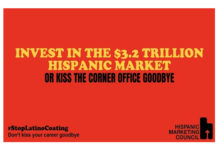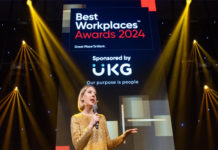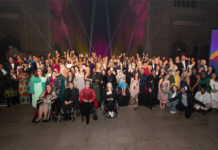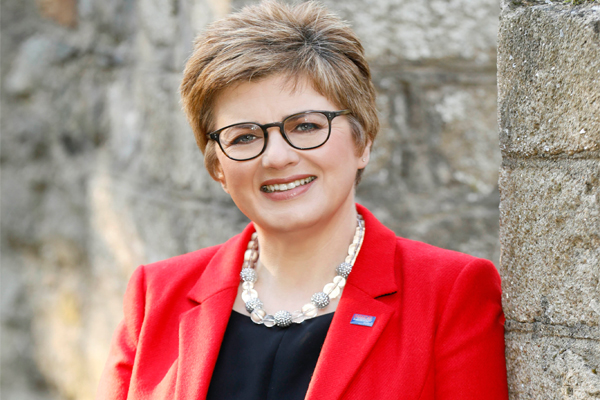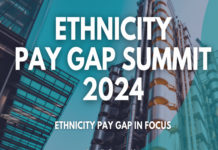Margot Slattery, who was promoted to Global Chief Diversity & Inclusion Officer of Sodexo Group at the end of last year, talks to Pepi Sappal about her plans to ramp up belonging and inclusion, and champion equality for all underrepresented groups wherever she is in the world.
Margot Slattery was a natural choice to become Sodexo’s Global Chief Diversity and Inclusion Officer to replace Rohini Anand, SVP Corporate Responsibility and Global Chief Diversity Officer, who retired last year. Although Slattery has a strong act to follow, the 28 years of climbing the career ladder to CEO of Sodexo Ireland, more than qualifies her for the global diversity and inclusion (D&I) role.
Over the years, she has collected several accolades for her many corporate achievements, as well as awards for being a strong LGBTQ+ advocate in the business world. Slattery has scooped numerous awards including the Chevalier de l’Ordre National du Mérite, and has appeared in the Financial Times’ Top 100 list of OUTstanding LGBT Business Leaders since 2015. She has also won FM Leader of the Year at the 2018 Facilities Management Awards and the Business Leader Award at the 2018 WXN 25 Most Powerful Women in Ireland Awards.
D&I PLANS
Slattery’s new global role, which she started in September of last year, is one that she has always aspired to: “D&I is my passion, and this role will give me an amazing opportunity to combine activism with my work.” As an equal rights activist, she has always campaigned for gender and LGBTQ+ equality, and has been strongly involved with campaigns, such as Ireland’s 2015 Marriage Equality Referendum.
Highly ambitious for continuous improvement, Slattery plans to continue to ramp up belonging and inclusion for Sodexo’s 470,000 global employees, particularly for those on the front line (around 370,000). “Our front line staff are mostly on client sites and we don’t always have a direct connection with them, so it’s important that we create a sense of belonging for them,” she says.
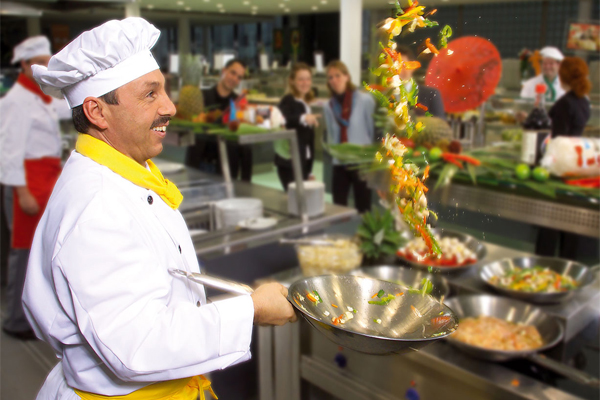
After 18 years of being on the D&I journey, “Sodexo is relatively mature in this area”, says Slattery. Rohini Anand, Sodexo’s first ever Chief Diversity Officer since 2002, made tremendous strides to promote D&I at the global food services and facilities management company. “Thanks to Rohini’s successful initiatives over the years, many people (internally and externally) are aware of our D&I work. I want us to continue this great work and I want to make sure that no one at Sodexo takes D&I for granted, whether its welcoming new members, interacting with our client organisations or members. So whatever we do in business, I want to ensure that we think about it through an inclusion lens.”
To achieve that, the firm’s business leaders and employees also need to understand their personal journey, she points out. “After all, everybody is on a journey, whether it’s ‘I have a disability health issue’, or ‘I have a child who is on the autism spectrum’; everybody has got something that they are dealing with. So, as a team we want to help our leaders and staff get to the next stage of D&I – which is deeper.”
DEEPER BELONGING & INCLUSION
So just how will Sodexo’s D&I team achieve this deeper sense of belonging and inclusion? “Over the last year, the D&I team launched a task force around disability and another for global generations to look at what we do to engage our people in these areas. We are now doing that for our other three key areas which include culture/origins, gender and sexual orientation and LGBTQ+,” she confirms.
One particularly interesting challenge for Slattery and her D&I team is technology and emerging/new ways of working. “We are looking at how we get our workforce ready for the next stage – the next workplace revolution. How do we help take the fear away, or at least help them get comfortable with change? It’s our job to help people to transfer to those new jobs. It’s not a case of simply rolling out courses and saying our obligation is done. We need to go deeper while always remembering the human element and the fear of change,” she explains.
“We need to make people feel included where traditional jobs and ways of earning money are changing. Organisations can’t walk away from that.”
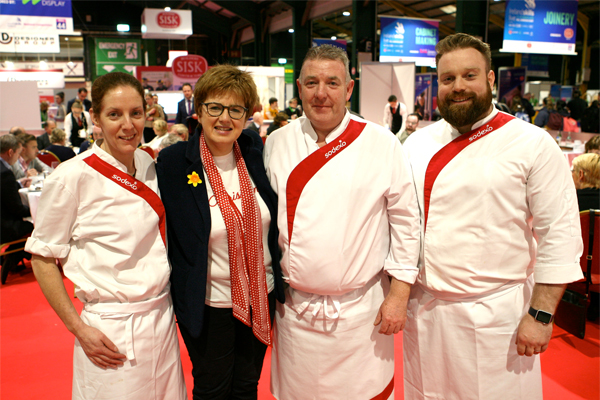
STRONGER HR ALIGNMENT
It’s certainly one of the many challenges Sodexo’s D&I team has been exploring with HR over the last few years. In fact, Slattery believes the key to creating that deeper connection of belonging and inclusion is through forging a strong connection with HR. “If you want to do things successfully around changing people’s behaviour, entitlement/terms and conditions, or how they are recruited, you’ll notice that there’s actually very little that doesn’t affect HR.”
Sodexo is therefore strengthening D&I alignment with HR to help achieve this vision. Slattery reports to Sodexo’s Chief People Officer, Cathy Desquesses, who by the way “is also very passionate about D&I”, she confirms. Given the ‘incredibly supportive’ HR and ongoing leadership backing, she doesn’t need to waste time getting D&I buy-in from the CEO/board, which many other D&I professionals are still battling to get. Leadership support is a must, she stresses: “Unless leadership is totally behind D&I, it’s never going to work. Leaders of big organisations must lead front, back and sides on this, so D&I must work hard to get that buy-in first.”
That said, you can’t force things onto people either, particularly around things like Pride, she adds. “You can’t tell people to get involved as they may have their own reasons, say, to be involved/or not, or, to be out/or not. So spend time creating D&I discussions around the issues that are important to you, create the awareness around it, and then let people get involved in their own time. You can’t force things on them, and it’s a very long process, so be prepared,” she cautions.
POWER OF ERGS
The power of Employee Resource Groups (ERG) should not be underestimated either. “They are key to making inclusion work. Very often these networks are the beating hearts for inclusion in organisations, so it’s vital to keep the pace going, and ensure they are energised regularly. But having just one or two executives at the helm is never going to work. It’s important for ERGs to be aligned with appropriate non-profit organisations or charities, depending on the group,” advises Slattery. “So, for example, Sodexo’s Global Pride Group partners with organisations such as Stonewall, Pride for Business and HRC, to help ERG initiatives reach a whole new level.”
Although Slattery may have a new title, she has already been exposed to many of the D&I challenges that she will face in her global role at Sodexo, thanks to her ongoing interest and commitment to equality over the years. Solid business knowledge is vital for senior D&I professionals, so her international business experience and understanding of P&L and operations will stand her in good stead to achieve her D&I vision.
GLOBAL CHALLENGES
“A good understanding of both global and local business and geographic challenges are also vital to decide which D&I strategy/solution is right for your organisation,” she adds.
The breadth and extent of D&I issues, which vary from country to country, can be immensely challenging. “Our work in Brazil, for example, is hugely different to India. In Brazil, our team is focused more on empowering refugees, whereas our work in India is very much concentrated around promoting gender equality. In other parts of the world, we are focusing on helping to end violence against women in communities. So everything depends on the specific environment you are operating in and what’s appropriate for the workforce in that country,” she explains.
“Sodexo’s D&I team are very hard working and go the extra mile to help and support our teams wherever they are in the world. As you would expect, a good amount of travel is involved, especially in my first year in this role. However, we are an organisation that embraces and promotes flexible work, so I can work wherever I am, at any time. My office is my laptop,” quips Slattery. “Thankfully I’ve inherited a great global team, serving some 72 countries around the world, and we are also well supported by our company’s diversity champions in each country we operate in.”
She also plans to continue fighting for equality for all underrepresented groups, not just LGBTQ+/gender, wherever she is in the world, confirms Slattery. “As someone who struggled with coming out during a time in Ireland when homosexuality was criminal, I can very much relate to anyone in the world who has to cover and hide and not be themselves. Because I was from a very traditional Catholic background, I didn’t publicly come out until my 30s. So I have a lot of empathy for anyone in world who has to cover and hide and not be themselves, or fears for their life – and that covers so many spectrums.”
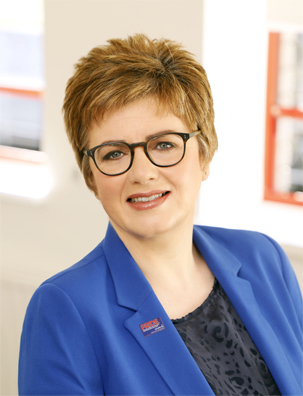
Image credit: Sodexo
RAISING THE ‘ANTE’
Slattery believes organisations and workplaces have a huge part to play in promoting equality, as well as being a vital source of support, especially in countries, say, where homosexuality is still illegal or dangerous. “My advice to companies is to make sure that everyone at every level of the business really understands what the LGBTQ+ challenges are in the countries you are operating in, both for employees living there and those travelling on business,” she advises. “For example, if I go to a gay bar, when I travel for work in another country where homosexuality is illegal, or simply travelling with my wife, we are in danger just because of who we are.”
Companies need to be aware of these issues and provide employee assistance. The teams in Sodexo have worked with health and safety and have carried out ‘safety moment talks’ about some of the challenges of travelling to places where it’s illegal to be gay. “We also work with NGOs to produce inclusive travel guides for travelling staff, so certain groups like trans are aware of any potential dangers,” she adds.
“Sodexo’s growing Global PRIDE Network also works very hard to protect our LGBTQ+ employees, even in countries where homosexuality is illegal. In countries where we don’t have a chapter because homosexuality is not legal, we try to have an embassy status to provide support and comfort to those employees that need it. We also raise the ante with leadership in countries where its very dangerous right now for LGBTQ+ people, like Brazil, parts of Africa and some of Asia, to ensure that there’s the understanding and awareness to protect staff in those locations.”
CORPORATE CLOUT
“Companies actually carry a lot of clout with governments in countries they operate in, and have the power to influence equality legislation positively, especially when they work in partnership with non-profit organisations,” concludes Slattery. “For example, the 150 companies, including Sodexo, which backed the Irish Same-Sex Marriage Referendum, definitely helped the cause.”
That’s why she continues to be heavily involved with organisations like HRC, Out and Equal and Stonewall, to promote equality not just at Sodexo, but around the world. That’s a topic of huge interest not only this month, as the UK celebrates LGBT History Month – but all year around, as D&I/wellbeing champions in countries, charities and organisations worldwide work together to promote equality and fairness.



